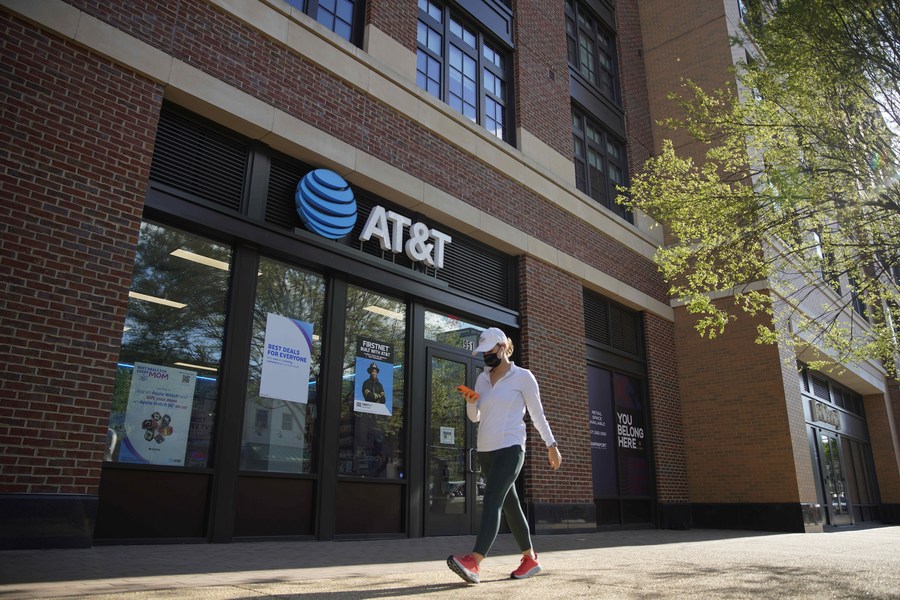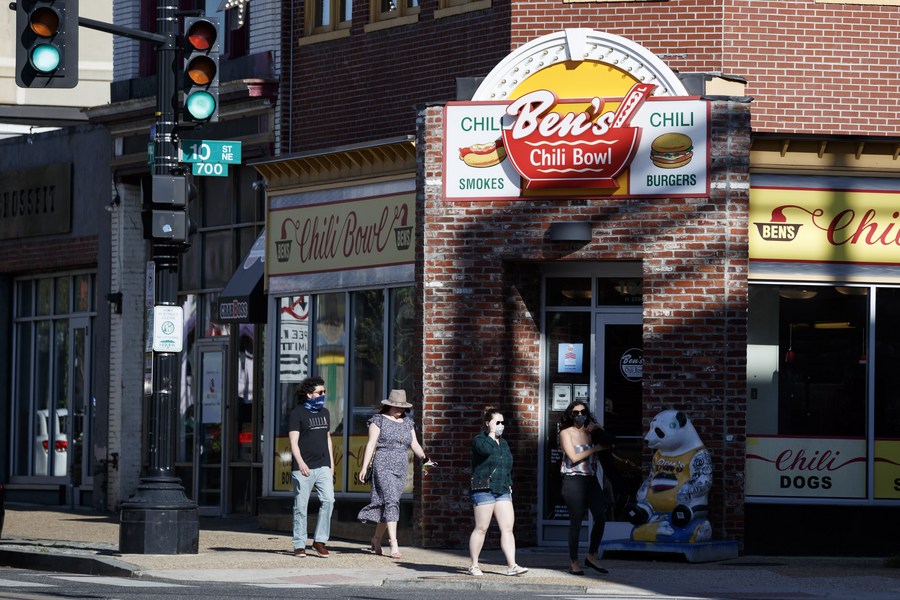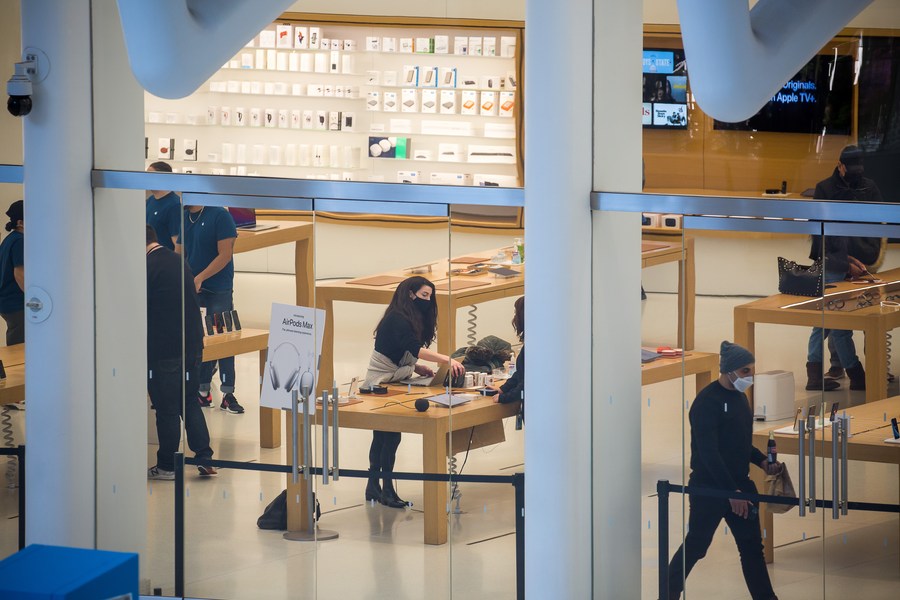
A woman walks by an AT&T store in Washington D.C., the United States, May 5, 2021. (Photo by Ting Shen/Xinhua)
The rule "has already been drawing fierce opposition, both in and out of court, from the anti-vaccine faction of the country's right wing. A number of Republican state attorneys general have vowed to challenge the rule once it is made public," said the media.
NEW YORK, Nov. 2 (Xinhua) -- The U.S. government is reportedly scheduled to release later this week its COVID-19 vaccine mandate for private-sector businesses with 100 or more employees, which is expected to face challenges and resistance.
On Monday, the government issued separate guidance on the mandate for federal contractors to allow them more leeway to handle an employee who refuses to get the COVID-19 vaccine, after pushback against the administration's COVID-19 vaccine mandates for federal contractors released in September.
The Office of Management and Budget has completed its review of the regulation requiring workers at private-sector businesses with at least 100 employees to be vaccinated against COVID-19 or be regularly tested. That review set the mandate up to be published on the Federal Register "in the coming days," said the U.S. Labor Department.
Employers who fall under the regulation must "develop, implement, and enforce a mandatory COVID-19 vaccination policy, unless they adopt a policy requiring employees to choose either to get vaccinated or to undergo regular COVID-19 testing and wear a face covering at work," according to a department statement.
"The rule is one of the (Joe) Biden administration's most ambitious attempts to increase vaccination rates to corral the pandemic, after the surge of the Delta variant this summer showed the country's continued vulnerability to the ravages of the virus," reported The Washington Post (WP) on Monday.
On Tuesday, the U.S. Centers for Disease Control and Prevention (CDC) updated that 221,760,691 people have received at least one dose of COVID-19 vaccine, making up 66.8 percent of the whole U.S. population; fully vaccinated people stood at 192,586,927, accounting for 58 percent of the total. A total of 19,178,738 people, or 10 percent of fully vaccinated group, received booster shots.
OPPOSITION
"Both mandates have drawn opposition from states led by Republican governors. Missouri and nine other GOP-led states sued the Biden administration last week to stop the contractor mandate. Arizona in September sued to stop the broader private-sector mandate, and other GOP-led states are taking steps in opposition," reported The Wall Street Journal (WSJ) on Monday.
The rule "has already been drawing fierce opposition, both in and out of court, from the anti-vaccine faction of the country's right wing. A number of Republican state attorneys general have vowed to challenge the rule once it is made public," said the WP report.

Pedestrians walk by a restaurant in Washington D.C., the United States, May 5, 2021. (Photo by Ting Shen/Xinhua)
Meanwhile, many businesses are awaiting details on the federal mandate before implementing their own vaccination rules. Some have questions about how they will need to document employees' vaccination status. Others, including Walt Disney Co. and meatpacker Tyson Foods Inc., have pushed ahead with their own requirements, according to the WSJ report.
Employers in the construction industry have been concerned about the mandate potentially driving workers who don't want to comply toward smaller companies that won't be affected by the rule, said Greg Sizemore, vice president of health, safety, environment and workforce development at the Associated Builders and Contractors.
"We are dealing with a very significant workforce shortage in the construction industry," Sizemore was quoted as saying. The mandate is "going to really influence and exacerbate that problem."
RELUCTANCE
The effectiveness of any legal challenge, however, is unclear. Government vaccine mandates, like those in New York, Chicago and California, have thus far withstood legal challenges, as have private mandates imposed by big companies and hospital systems. But they have often been met with a small but fierce resistance, according to the WP report.
In Chicago, as a deadline neared, Mayor Lori Lightfoot softened the city's vaccine mandate for municipal workers by allowing a twice-weekly testing option, at the employee's expense, instead of vaccination. The rule had drawn pushback from police and other union groups.

Apple store employees assist customers at the Westfield World Trade Center shopping mall in New York, the United States, Jan. 28, 2021. (Photo by Michael Nagle/Xinhua)
In New York, vaccine reluctance in some departments has also been pronounced. While at least 91 percent of the city's overall workforce had gotten at least one shot in advance of Monday's deadline, the rate lagged for police (84 percent), sanitation workers (79 percent) and the fire department (78 percent).
"Hundreds of firefighters called in sick in what appeared to be an organized protest. Sanitation workers were playing catch up, after garbage collection lagged last week," reported The New York Times, adding that for the most part, the city's vast municipal work force returned to work as usual on Monday.
Across all city agencies, about 9,000 municipal employees have been placed on unpaid leave -- all eligible to return to work as soon as they get a first dose of vaccine. Another 12,000 city workers have yet to get their first dose of a COVID-19 vaccine, but had applied for a religious or medical exemption. They are allowed to continue working while the city evaluates their requests. ■




